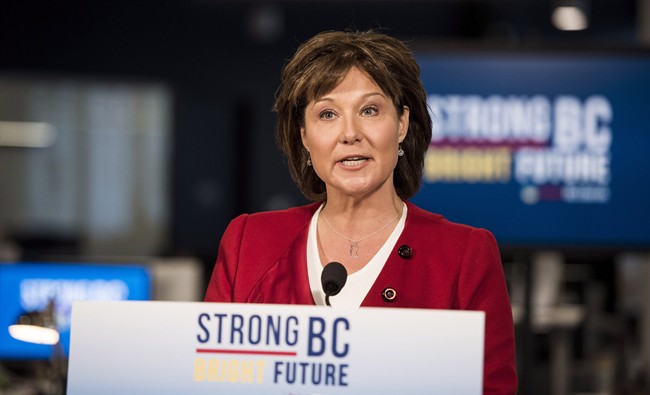As election day looms, B.C. Liberal Leader Christy Clark is switching gears and ramping up her fight against U.S. President Donald Trump.

In an event in North Vancouver last week, Clark said she would not be a “sucker for Donald Trump” when it came to accepting bad deals for British Columbia. It’s a message Clark has been steadily focusing on across B.C. at her campaign events since last Thursday.
The premier, who says U.S. protectionism is now front and centre in her campaign, is citing everything from Trump’s stance on B.C.’s aluminum business, tech sector, softwood lumber and wine industry.
So what has Trump actually said about B.C.?
Turns out, Trump hasn’t really been that focused on B.C. But there’s no denying some of his plans regarding Canada will have a ripple effect across the province.
Here’s the breakdown:
B.C. wine: In January, the U.S. government launched a trade challenge with the World Trade Organization (WTO) over Canada and B.C.’s policy of restricting wine sales in grocery stores exclusively to B.C. wines. The challenge claims discrimination against U.S. winemakers and that it violated our country’s WTO agreements to treat imports no differently than domestic products. B.C. Jobs Minister Shirley Bond said the province will defend itself and believes they complied with all international trade agreements. If this challenge goes through, critics say it could displace B.C. wine on grocery shelves in favour of cheap worldwide wines.
Softwood lumber: In April 2017, the U.S. Department of Commerce said it would subject Canadian lumber imports to tariffs ranging from three to 24 per cent. Canada’s wood comes mostly from Crown land, with artificially low prices giving Canadian companies an unfair advantage, the U.S. administration alleges. In response, Clark said greedy American “lumber barons” are to blame for the softwood lumber dispute, and their push to choke off the supply of disputed Canadian timber will only make it harder for the average American to buy a home. Clark went on to say at a campaign event that if the Liberals are re-elected on May 9, they will not rest until a fair trade deal is reached.
READ MORE: Former U.S. ambassadors blast Donald Trump over softwood lumber dispute with Canada
Clark fired back at the U.S. administration’s lumber import tariffs by promising a hefty carbon tax on U.S. thermal coal. She said she would tax the coal that’s shipped through the province’s ports to make it uncompetitive and defend workers from the policies of U.S. President Donald Trump.
“Now is the right time to do it, the right time to send a strong message to the Trump administration and U.S. lumber barons that we will not back down in the face of their aggressive attacks on workers here in British Columbia,” said Clark.
READ MORE: Canadian lumber layoffs could begin next week, B.C. MP says
Clark said she wrote to Prime Minister Justin Trudeau and asked Ottawa to stop the export of the coal, including from the United States.
Forestry policy experts along with her political opponents have said while the future premier will have some say in the matter between Canada and the U.S., it will stay within our country’s borders and not extend to discussions that will take place in Washington.
WATCH: U.S. president takes aim at B.C. lumber industry

Dairy industry: In April 2017, U.S. President Donald Trump launched a scathing attack on the Canadian dairy industry, as he tried to push his America First agenda during a speech in Wisconsin. Trump’s remarks were made over a growing trade dispute between Canada and the U.S. over the dairy products: specifically ultra-filtered milk, a product which allows for greater efficiency in cheese-making.
After years of American farmers sending their ultra-filtered milk north of the border without being subject to tariffs, Ontario dairy farmers agreed last year to sell ultra-filtered milk to Canadian processors, such as Saputo Inc. and Parmalat Canada Inc., at prices competitive with international rates. British Columbia and other provinces soon followed suit.
READ MORE: Dairy industries in Canada and the U.S. – By the numbers
While it’s unknown how or if the province’s dairy industry will be impacted, the B.C. Dairy Association, which represents Canada’s third-largest dairy sector, said in a Globe and Mail interview in April that they would be paying close attention in the lead-up to the May 9 election and what position the provincial party leaders take.
Aluminum imports into U.S.: In April 2017, frustration escalated in Canada’s aluminum industry over an effort to impose a 50 per cent tariff on aluminum imported into the U.S., most of which comes from north of the border. The United Steelworkers union filed a petition with the U.S. International Trade Commission that aims to stem the flow of imported primary unwrought aluminum it claims has decimated the American industry and jobs.
How will it impact B.C.?
Rio Tinto, Canada’s largest aluminum producer and the world’s third largest, said imposing a tariff would raise prices for U.S. manufacturers and jeopardize jobs. Spokesman Bryan Tucker said the company fears that a tariff would harm the competitiveness of its plants in Quebec, British Columbia and around the world.
POLL:
~ with files from Canadian Press and Keith Nielsen





Comments